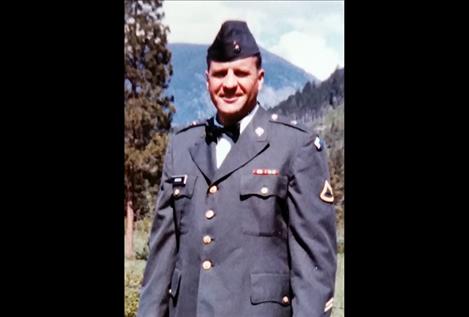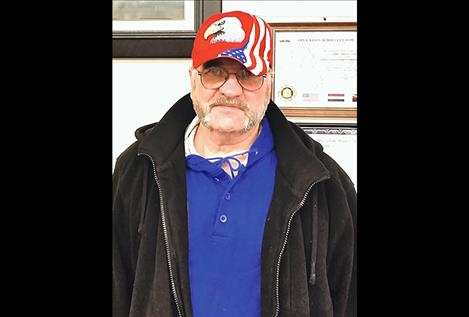Veteran Spotlight
Richard Janssen January 27, 1946 Vietnam, Persian Gulf U.S. Navy plus Army and Air Force Reserves — E-6
Hey savvy news reader! Thanks for choosing local.
You are now reading
2 of 3 free articles.
When asked if he was in the Army or Navy, Rich says, “Yes, and the Air Force, too. I wasn’t a ‘lifer’ but I put in 20-plus years.” Well, how did all of this happen?
Rich was 17 years old, just six months out of high school in Illinois. He figured he would get drafted. His dad was a Marine and an uncle was in the Navy. Not knowing anything about rebelling against the government, Rich decided just to enlist and he chose the Navy. He went in Nov. 29, 1963.
Boot Camp was nine to 10 weeks at Great Lakes, Illinois, Co.552, where Rich was appointed Master at Arms. Navy Boot Camp was just like the Army Boot Camp – lots of marching with weapons. Still at Great Lakes, he started basic training for MMA School (Machinist Mate A). After that he went to Mare Island, California, to nuclear power school for submarines. Two years worth of basic college courses were crammed into six months: trigonometry, calculus, atomic theory, metallurgy, etc.
Next, Rich got prototype training for nuclear power submarines at the Nuclear Propulsion Training Unit at Windsor Locks, Connecticut. The S1C Prototype was a mock-up of a real ship but on land. Guys who had never been on a real boat lacked sea experience, which was a disadvantage. Rich had a high 3.2 grade point average, but when he went before the oral board of review, they decided not to place him on nuclear submarine duty after all. When asked if he’d like to go to Annapolis, the Naval Academy, instead, Rich said, “No way! I’ve had enough of books!”
So Rich was sent as Machinist Mate to a Victory Ship, the USS Washburn AKA108 that served the WEST PAC (Western Pacific) including Japan, South Korea, the Philippines, and Vietnam. In Navy slang, the guys who worked topside were called “deck apes” and machinist mates like Rich were called “snipes.” One time an officer reminded him, “You will call me ‘sir.’” “Yes, sir,” Rich replied. He worked on the lower level with the pumps and steam condensers. The ship ran with boilers rather than nuclear power. Rich was never seasick, but, he says, “You don’t feel much in the engine room at the bottom of the ship.”
Rich was never on land in Vietnam nor shot at from enemy territory; but in a way the ocean was the enemy. One time the ship was caught in a typhoon. The pumps may have been stressed by running off-level and short circuited. Anyway, the condensation pump caught on fire and the vacuum level was going way down. Rich had learned in nuclear sub school how to transfer power to different pumps and keep up the steam, which he did, and the ship was saved. That same officer came below decks all worried about the situation. Rich told him, “I have it under control, SIR!” During this time he made second class petty officer E-5, which is like Staff Sergeant.
Rich returned to his home port of San Diego, California for early discharge in 1967 after three years, 10 months and a few days. Did he think about staying in? “No, one four-year tour was enough.”
After being discharged in 1967, Rich headed north from California, driving a ’52 Ford ragtop in the winter. He ran out of money in Missoula, Montana so he went to work locally and eventually made Montana his home. After getting a Bachelor’s degree in Agronomy and Range Management from Montana State University in Bozeman, Montana, in 1990 Rich decided to join the Army Reserve Unit connected to Lewiston, Montana. He later transferred to the Great Falls unit, and finally to the Kalispell unit. Reserve status means “civilian subject to be activated.” Being in the Reserves was a sideline – his main job was with the BLM and later the BIA in different locations.
Beginning in November of 1990, Rich spent six months on active duty in the Persian Gulf with the Kalispell unit. They did readiness preparation in Fort Lewis, Washington and left for duty Jan. 15, 1991. The day they flew into Riyadh, Saudi Arabia was the first day of the air war. It was later expanded after a couple of months to also be a ground.
From Riyadh, Rich’s unit went north to an area where Kuwait, Saudi Arabia and Iraq come together. He was a cook but went as a driver of a deuce and a half (two-and-a-half ton truck), stood sentry and did other soldier duty. The only cooking he ever did was making one flat of brownies. The unit wasn’t really in a combat zone but they could see and hear the planes going over on their way to bomb Baghdad and other points north. He got a taste of a soldier’s life sleeping in a sheepherder’s tent that they found in the area. His unit was a water supply unit, purifying water and transporting it where needed, including prison camps. Rich said at 45 years old, it was spooky seeing some of the young guys with guns playing Rambo. One soldier was shot by “friendly fire” and the shooter ended up in prison for carelessness.
Rich transferred from Army to Air Force Reserves in 1998 because he wanted to keep on as a cook. He retired again in 2006. In thinking back, Rich could have gone to Annapolis, but… he’s satisfied with his life choices. He says he doesn’t see himself as anybody’s hero and he wasn’t interested in ribbons or rewards. He was just doing a job and at the end of each one he was ready to go home.
Thank you for your service Rich.

















